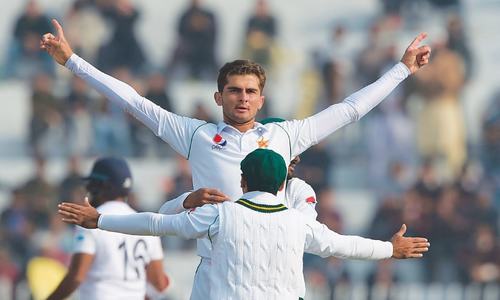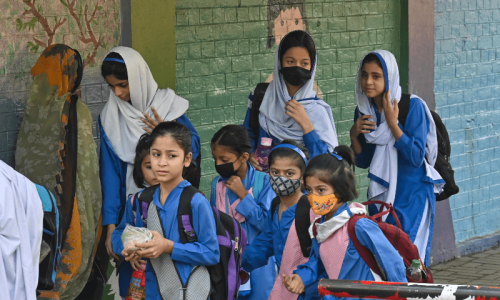
The middle two weeks of December were surreal for Pakistan’s most popular sport. The eagerly-awaited return of Test cricket finally became an unambiguous reality amid the truly warm feelings of joy, even though the weather was chilly as it usually is at this time of the year. The warmth on the playing fields of Rawalpindi and Karachi was evident on the face of every cricket lover.
The icing on the cake was perhaps that it was Sri Lanka — whose innocent cricketers were in the firing line of that barbaric terror attack during the middle of the Lahore Test in March 2009 — was the one to put Pakistan back on the map of Test cricket.
Not being able to play home internationals had forced the Pakistan Cricket Board (PCB) to seek solace in the United Arab Emirates for a lengthy period, although the PCB had earlier played hosts to the West Indies and Australia there in 2002 as well over security fears, arising from the ramifications of the Sept 11, 2001 terror attacks in the United States.
It is an irony that Pakistan needed home advantage to get back to winning ways at the highest level of cricket, and the result — a win by 263 runs in the Karachi Test — illustrated just how much they missed the passionate support and inspiration of playing in front of home fans. The first Test in Rawalpindi was dampened by rain and chilly conditions with the light also hindering the enjoyment of the spectators who were the real stars, because not only had they turned up in big numbers, their presence also infused much-needed life into Test cricket.
Test cricket returned to Pakistan after 10 years and nothing could be better, with Sri Lanka doing the honours of picking up from where they left off
The sight of people in the stands both at the Rawalpindi Cricket Stadium and National Stadium Karachi clearly proved how much home-based Pakistanis missed top-flight action. Several senior cricket writers associated with the game for more than 25 years also point to the massive turnaround with Test cricket making a welcome return to home soil as the biggest moment for the sport.
“Pakistan cricket has suffered hugely due to the isolation,” quips Abdul Majid Bhatti, who works for a leading Urdu national daily. “Our players, our fans, our system, our cricket board and our grounds have lost as we have not been hosting international cricket for all those years. The fans have been the real sufferers because they had been deprived of international cricket at home, which is the worst loss for any cricketing nation. In our case, this is the biggest comeback because we were once one of the most sought-after cricket teams in the world.”

Shahid Akhtar Hashmi stands out among the cricket reporters because he is the only one to have covered all of Pakistan’s 31 Tests staged in the offshore territory of the United Arab Emirates since November 2010.
Shahid says: “The most telling loss is of the generation born at the turn of the 21st Century. They have not seen their own players playing before their eyes. That eventually diverted them from cricket to take up other sports. Moreover, this badly hurt the talent factory in Pakistan. Other than this, the PCB suffered immense losses to the tune of 300-400 million dollars in revenues during the isolation.”
Another well-known face of Pakistan’s cricket journalism, Ehsan Qureshi, remarks: “The isolation has changed a lot of things with no international cricket in Pakistan for more than 10 years.
Despite the importance attached to Test matches, people are more attracted to the shorter format of the game, especially T20s. And the launch of the Pakistan Super League on home soil has changed the cricketing culture of our nation. But the lack of Test matches here deprived us of the chance of grooming players in a familiar environment.”
Brian Murgatroyd may not have been a household figure for Pakistanis but those who know him well are impressed by his humble nature as a seasoned analyst, broadcaster, ICC media official and now head of TV broadcasting team, which was on hand to cover the recent Test matches against Sri Lanka. According to the Dubai-based Murgatroyd, the return of Test cricket to Pakistan is the culmination of sustained spadework by the PCB and a self-belief that the country is as safe as any other country to stage international matches.
However, he has words of sympathy and hope for Pakistan in many ways: “The country has suffered from a cricketing perspective in several ways. Youngsters here haven’t been able to see their heroes in the flesh and you need contact with role models to inspire the next generation, something that’s now happening again, thankfully.

“On top of that, the country has suffered financially as every so-called home series needing to be played off-shore costs far more to stage than in Pakistan. And without international cricket in Pakistan, the infrastructure suffered too. Thankfully all that will be in the rear view mirror now.”
Dimuth Karunaratne, the Sri Lankan captain, openly regretted skipping the One-day International leg against Pakistan in September when he and several top players refused to tour over security fears. “That was a bad mistake on my part, I must admit,” Karunaratne revealed during the media conferences in Rawalpindi and Karachi when questions on this issue were fired at him. “There is no doubt in my mind now that Pakistan is very safe to tour and play cricket. Wherever we went we were looked after very well. In fact, the security at times was too much because we were not allowed to go and explore places on our own. Even at the shopping malls, these [security] people were right behind us, which at times made us feel very uncomfortable. No space to breathe in open air, really. Hopefully next time [when Sri Lanka visits Pakistan again], we will be expecting more freedom to enjoy the hospitality and generosity of the Pakistanis. They are always very loving people who look after you very, very well…”
This appeal from Karunaratne means a lot to the Pakistanis because visitors such as him are true ambassadors of their country. We must be always appreciative of Sri Lanka’s truly wonderful gesture in reviving Test cricket on Pakistan soil. The onus now is on other teams to emulate the Sri Lankans.
The writer is a member of staff
Published in Dawn, EOS, December 29th, 2019















































Dear visitor, the comments section is undergoing an overhaul and will return soon.